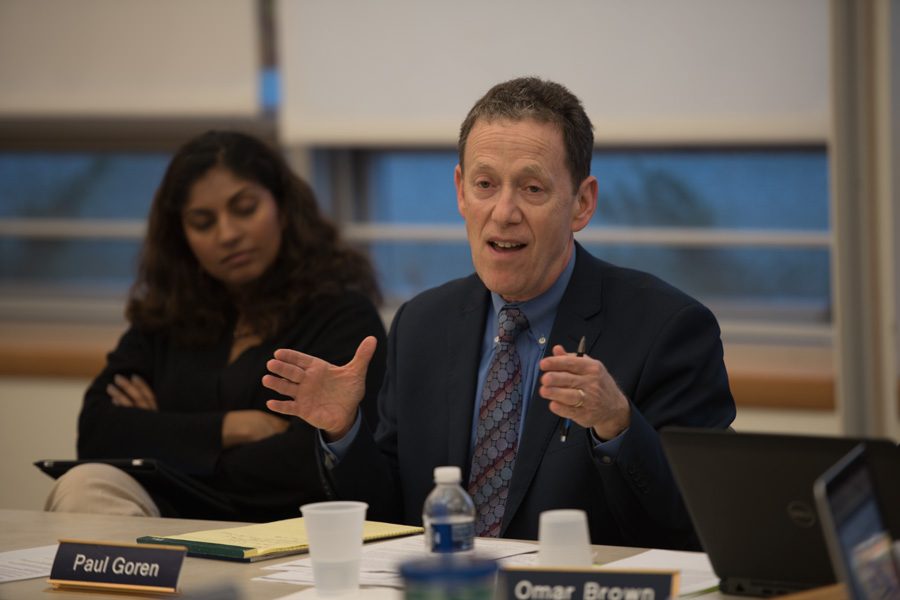District 65 committee readdresses racial equity, hopes to implement policy soon
Courtney Morrison/The Daily Northwestern
Evanston/Skokie School District 65 superintendent Paul Goren and District 65 Policy Committee chairwoman Suni Kartha (Weinberg ‘97) discuss how the board can implement equity policy at a committee meeting Monday. Community members who attended the meeting suggested a partnership with the Organization for Positive Action and Leadership.
April 19, 2016
Evanston/Skokie School District 65’s Policy Committee discussed Monday how to address equity — specifically racial equity — at the first public follow-up meeting since the issue was introduced in December.
Both committee and community members expressed their frustration during the meeting at Joseph E. Hill Early Childhood Center, 1500 McDaniel Ave. Community members were displeased with the board’s delayed response in addressing equity, while committee members said they were upset at being perceived as “uncaring.”
“For us as a board to get defensive about why the frustration is there is not productive,” Policy Committee chairwoman Suni Kartha (Weinberg ‘97) said. “Instead of coming from a position of being defensive, we have to prove our commitment. We have to prove that racial equity specifically is important to us.”
Equity is giving each student what he or she needs to be successful and be on equal footing with others, Kartha told The Daily. Equity does not entail equality of initial distribution but an equality of final standing, Kartha added.
Representatives from the Organization for Positive Action and Leadership, which hosted a discussion on the differences between racial equity and equality in Evanston’s education system last week, were also at the committee meeting. Officials from OPAL said they were willing to work with the committee to provide students with equal access to opportunities, as well as resources and training programs that will enable District 65 members to actively examine and eliminate institutional barriers to racial equity.
“There are educational laws in place that address pretty much all areas except for race,” OPAL board member Roger Williams said. “Change has to start from the inside. Racial stereotypes and low expectations of people of color are high predictors of achievement.”
Community member and OPAL supporter Alex Morgan said it is crucial that teachers are trained to deal with and recognize racial discrimination in addition to the required training on how to address students with special needs. He also encouraged the committee to avoid “carbon-copying” another area’s policy on equity to the schools within District 65.
Several other community members recommended the committee partner with OPAL to implement policy tailored to the students in the district and to create a timeline that could later be shared with the public. OPAL suggested the committee submit a proposed equity statement by May 23 and a final statement by June 13. Committee members said the official timeline may differ.
Regarding the timeline, Kartha said she believes the committee will first come up with an equity statement that outlines the district’s values and commitment to promoting racial equity.
An audit, or an official examination, will then follow to determine whether these standards of racial equity are upheld across the district. Kartha said the findings and examples from the audit will shape the policies that will later be implemented.
Committee members discussed using Evanston Township High School’s statement on equity and excellence as a basis for their own, and whether to create several policies focusing on different groups. This way, not only students in the black and Latino populations would be addressed by the equity policy, but also those in special education, for example.
“I agree that it’s important to address all kinds of gaps in some way,” District 65 Superintendent Paul Goren said to fellow board members. “But we have to be explicit about race.”
Email: rishikadugyala2019@u.northwestern.edu
Twitter: @rdugyala822



